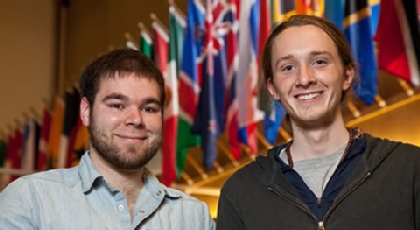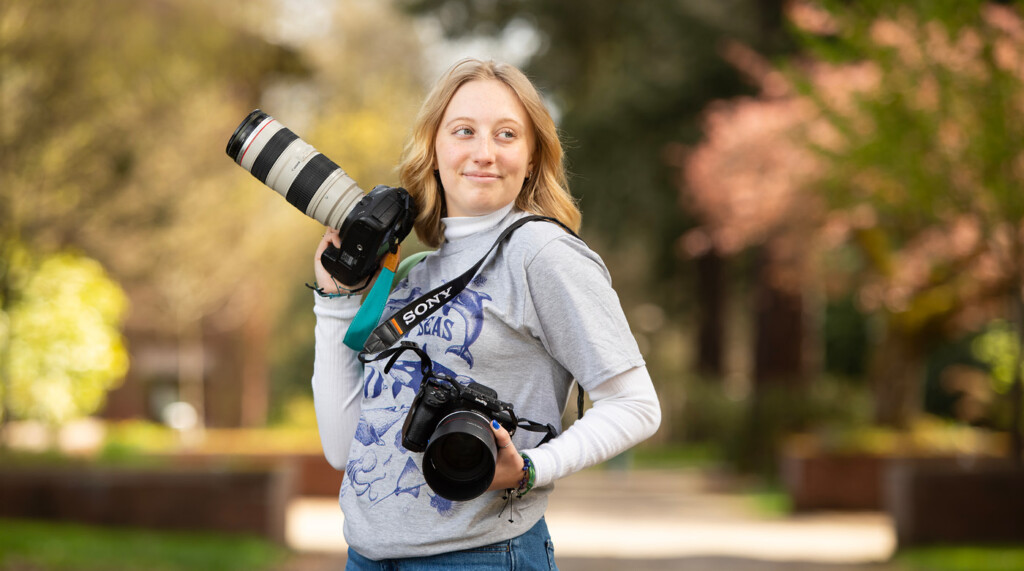Page 177 • (3,095 results in 0.039 seconds)
-
District.Asieh Mahyar Passionate about performing music from different cultures, Prof. Asieh Mahyar is the interim Director of Orchestral Studies at Pacific Lutheran University where she conducts the PLU Symphony Orchestra. Ms. Mahyar is a candidate in Doctor of Musical Arts in Orchestral Conducting at Michigan State University, where she studied with Octavio Más-Arocas and Katherine Kilburn. She received her MM in Orchestral Conducting from University of Massachusetts-Amherst under the mentorship of
-

national park to understand more about how people and land use practices impact the ecology of small mammals. “It is a great opportunity to do research and get to know another culture,” Ojala-Barbour said of why he applied for a Fulbright Fellowship. The Northfield, Minn. native graduates this spring with a degree in environmental studies and Hispanic studies. He’s not sure how the experience will shape him or what he’ll do once his fellowship is complete. It may lead him to graduate school to study
-

. They have three CDs to their credit, all of which hit top-10 rankings with jazz stations all over the world. This nationally renowned treasure based in the Pacific Northwest has been featured by articles in Jazz Improv, LA Jazz Scene, Brass Herald and more. August 2 – David Deacon-Joyner Trio with Dennis Hastings David Deacon-Joyner is professor and director of jazz studies at PLU. A native of Memphis, Tenn., Deacon-Joyner was mentored by jazz piano great James Williams, and has performed with jazz
-

writing three scenes, and with the help of some PLU singers and software simulating an entire orchestra, they got to hear some of their work. “She was very intrigued with the music,” Youtz said. They decided to stop in the face of uncertainty. “Why would you write an entire opera if you don’t have a performance in mind?” Youtz pointed out. “That would be a lot of work, and maybe for nothing.” But then James Brown, chair of vocal studies and director of PLU’s opera programs, started talking with Youtz
-

requirements, Tamara Williams and Joel Zylstra — directors of the Wang Center for Global and Community Engaged Education and the Center for Community Engagement and Service, respectively — found that some students were already completing the program just based off their majors. “It was global studies, environmental studies and Hispanic studies,” Zylstra said. “When there is overlap like that it’s kind of like ‘why not?’” Zylstra and Williams were approached by the Peace Corps in 2015, in an effort to reach
-

Emma Stafki ’24 explores the challenges facing Puget Sound orcas in capstone documentary Posted by: Zach Powers / April 29, 2024 Image: Emma Stafki ’24 is a communication studies major from the Key Peninsula. (Photo by Sy Bean/PLU) April 29, 2024 By Lora ShinnPLU Marketing & Communications Guest Writer Emma Stafki grew up on Washington’s Key Peninsula, hearing stories about a tragedy in 1968. In nearby Vaughn Bay, her grandparents witnessed the heartwrenching capture of Hugo, a three-year-old
-
service or tenured or tenure-track faculty90%75% Tuition discount benefit amounts listed above are for full-time (1.0 FTE) employees working regular appointments. Benefit levels are prorated for part-time employees on regular appointments of at least half-time (.5 FTE) but less than full-time (1.0 FTE). The employee and his/her spouse or qualified domestic partner are eligible for undergraduate and master’s level studies. Employees, spouses and qualified domestic partners are limited to one master’s
-

contributors (10 from PLU) working on replications of eight highly cited psychological studies, it’s a major undertaking with international implications—and a multifaceted mission. CREP (rhymes with “grape”) not only helps validate psychological research findings; it also allows undergraduate students to engage in potentially publishable research. “Most student projects, the data go nowhere,” Grahe said. “In my classes I’ve always tried to get undergrads to do projects that might be publishable, but the
-

travel and interning for a conservation nonprofit. But now, she says, serving as a park ranger feels like the perfect fit. “I really love working for the Park Service because it’s an organization I can really believe in,” Plog said, “tasked with preserving places for future generations and also making sure people can enjoy them now. I love being part of that.” Plog, who is currently working at Yosemite National Park in California, double majored in communication and global studies at PLU. She also
-

, research methods, materials and data are shared digitally around the world to tackle inquiries. Why is this important? Traditional research can yield low replicability of previous studies. This suggests—in part— questionable research practices, including manipulating data to fit hypotheses and desired results, or worse yet, data fabrication. A “replicability crisis” (i.e., the inability to replicate earlier research findings), is addressed with open science practices. Benefits of open science include
Do you have any feedback for us? If so, feel free to use our Feedback Form.


